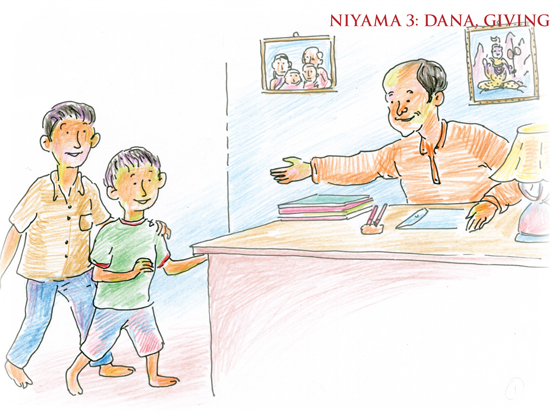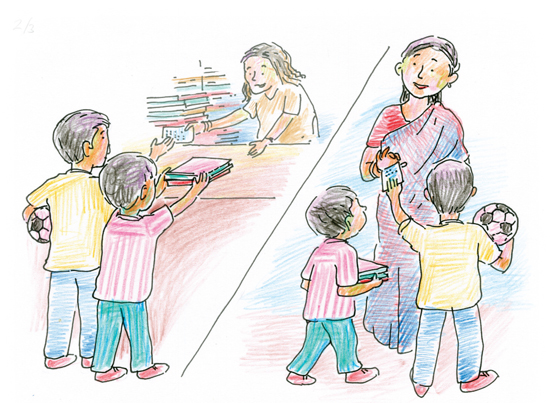Tithing and the Family Budget
Senthil said to Muthu, “Appa called me to the study, not you.” “He called me, too,” insisted Muthu. It was the first time the two boys, Muthu, 12, and Senthil, 14, had been called to the study for a meeting. It was their father’s den and they knew lots of important discussions happened there.§
Appa opened the door and smiled, “Welcome to my den!” Amma was there, too, sitting in a chair beside the desk.§
When Appa smiled, two sharp dimples appeared on his cheeks, making his face look soft and kind. His hair was now gray, and when he walked, his body was bent more than before. Still, for the two children, he was the dearest man in the whole world.§
“I heard an argument outside,” he said with a twinkle in his eyes.§
“Appa, Senthil says you called him only and not me!” answered Muthu.§
“No. I wanted to see both of you. Amma and I want to talk to you about the gift you received from Grandma and Grandpa for Pancha Ganapati. How much was it, again?”§
“$101 each,” exclaimed Muthu. “I’m going to buy a bicycle and a Wii and five new video games!”§
“Not so fast,” said Amma with a laugh. “Remember when you each got $25 from your aunt and uncle for your last birthday? What was the first thing we did with the money?”§
“I remember,” said Senthil. “We put $2.50 each in the donation box the next time we went to the temple. You said that was God’s share of the money—’teething’ I think you called it. But doesn’t God already have enough money?”§
“I suppose He does,” replied Appa, “and its ‘tithing,’ not ‘teething.’ Tithing is a spiritual practice for our own benefit, not because God needs more money, though the temple can certainly use it to pay bills.§
Then we always have a nice temple to go to.Ӥ
Appa sat down at the desk beside Amma and pulled up two chairs for the children. Today’s discussion was part of teaching the boys about money.§
Unlike in many families, the boys were not given allowances. Instead, if they needed something, they asked Appa or Amma for the amount and afterwards turned in an accounting. Most of their friends got a weekly allowance, but Muthu and Senthil had both noticed their friends tended to waste the money on junk food and unneeded items. It was a little difficult for them, but as young as they were, they appreciated their family’s system of handling money.§
“Do you both know what the word budget me asked Amma.§
“I know! I know!” Senthil called out, “It’s the amount of money that’s supposed to be spent on something each month. Like last month, you said our monthly electrical bill was over the budget. You said we have to be really careful to turn off the lights so that we keep the bill down.”§
“That’s right,” replied Amma. “In the same way, we have a budget of $80 to have dinner in a nice restaurant once a month. In fact, we have a written budget for all other family expenses. However, the first expense is always tithing. Then we put money aside, some for emergencies and some for your college educations. After that comes the home mortgage, taxes to the government, and car payments. These are always the same amount, and we pay them every month. We also have expenses for food, clothing, vacation and so on. Now, since you have gotten a large gift, we are going to write down a budget for it. But first we want to talk more about tithing. Any questions so far?”§
“Why is tithing the first expense?” asked Muthu. “What if there isn’t enough money for food and other expenses?”§
Appa replied, “Tithing means ‘one-tenth.’ In ancient India, people set aside one-tenth to one-sixth of their income for religious work. For our family, each month I send our Guruji ten percent of our earnings. I have taken a vow to do so. It is part of our spiritual practice.”§
“Wow, isn’t that a lot of money?” asked Senthil. “Why do you do it?”§
“Well,” replied Appa, “When I was young, I never gave money to anyone at all. I didn’t think I could afford it. Then I met Guruji, and he taught me that tithing on my income brings God’s blessings on the money. At that time I didn’t quite know what he meant by that, perhaps that I would win the lottery!” Appa laughed.§
“I didn’t win the lottery, but something even more wonderful happened. Before I started tithing, I was always short of money. I didn’t keep track of how I spent the money I earned each month. I even owed some people money that I could not pay. Then, I made a budget, so I knew just how much I could spend each month. That way, I could tithe and still not run out of money. At first it was hard, especially since I wasn’t making much. However, I made up my mind to tithe each month and never miss. So, I started to look very carefully at how I spent money. Also, I hadn’t been saving anything for emergencies.”§
“That’s not very smart,” Muthu interjected.§
“No!” Appa replied, “It’s not smart at all. Sometimes in an emergency, there is a need for extra money! So, in addition to the tithe, I started saving five percent of my salary each month. This made it even harder to pay all the bills! Then I found how to stop being wasteful. For example, instead of buying light bulbs one at a time, I went to the big store and bought two dozen all at once at half price. I also started to bring coffee to work in a thermos from home instead of buying a big cup of coffee at Starbucks each day. I found I saved $70 a month just on coffee!”§
“I think I understand,” said Senthil, “that’s the reason why Amma buys cases of things. I couldn’t understand why it is cheaper, because a whole case is expensive. Now I see. It’s cheaper in the long run.”§
“You both know that I always give you money for what you need,” Appa said, “but I don’t give you an allowance to spend as you please like other families do. You get money for a purpose and you turn in an accounting.”§
“Sometimes that’s hard,” complained Muthu.§
“Yes, it is,” Appa replied, “but your mother and I do the same thing ourselves. We account for everything. You have to know how you spent your money, otherwise you will never know if you have kept within your budget.”§
“So, back to my story. I kept to the budget and found out we always had enough for what we really needed.” Appa went on, “I was very pleased to give money to Guruji for his noble work. And God did bless us. The two boons we got were that we no longer owed money and we actually started saving for the future. That was twenty years ago. Today we have an emergency fund and a college fund for each of you. Those blessings came to our family because we tithed.”§
Senthil gazed at his father, “Your faith in God is the best gift you have given me, Appa. I love what you are doing. Next time we visit Guruji, I will ask him about tithing.”§
“Very good. Now, about the budget,” said Amma. “Muthu, how much would all the things you want to buy cost?”§
“I don’t know,” replied Muthu sheepishly. “Maybe $75?”§
Some quick research on the Web showed it was at least several hundred dollars. It was far more than the boys could afford, even if they combined their gifts. So Amma had them both make a list of what they wanted and how much it would all cost, both new and used. For example, they learned that a used Wii console on eBay was half that of a new one, and a used video game was less than a third the cost of the new one. What difference did it make if a video game was used or new?§
They created a budget. First, $20.20 went to tithing, ten percent of their combined $202. Then they decided that since Senthil already had a good bike, they would only get a new one for Muthu. Plus they would buy the Wii console and some games—all used.§
Appa congratulated them. “This is a great budget, boys. You thought through what you wanted and how to get everything at a good price. This is just what your mother and I do at the beginning of each month. I think, however, we should get you both new bikes. We will sell Senthil’s old one, and Amma and I will make up the difference.”§
“I’m proud of you,” said Amma. “You will find that when you make it a discipline to tithe and do it as your first expense, you will start to ask yourself if you really need what you are about to buy. This will help you to control your desire and channel it toward useful things.”§
And so concluded the boys’ lesson that year in money, budgets and tithing. When they got ready to enter college, there would be more discussions and explanations to help them manage their finances just as wisely as their parents do, always remembering that their first expense is for God’s work.§









